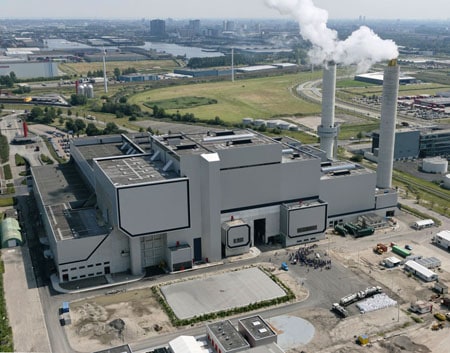EXCLUSIVE: Moves by the Dutch government to tackle climate change may include a tax on the import of refuse derived fuel (RDF) which could have major impacts on the cost of residual waste disposal for businesses and councils in the UK.
Members of the Dutch parliament are meeting later today (3 July) to discuss the Netherlands’ National Climate Agreement, which was outlined by the Minister of Economic Affairs and Climate Policy, Eric Wiebes, last week.

The AEB facility in Amsterdam is among the EfW facilities in the Netherlands to import feedstock from the UK
The National Climate Agreement follows the conclusion of the Urgenda court ruling. This is forcing the Dutch government to take more stringent action to reduce greenhouse gas emissions by the end of the decade.
Late yesterday evening it emerged that the proposals are likely to include the potential for a tax on the imports of ‘foreign waste’, with a knock-on effect on the trade in RDF from countries such as the UK. And, the tax could also impact on waste wood exports.
Thermal
Despite more energy from waste (EfW) capacity coming online in the UK – a significant proportion of UK waste is exported into mainland Europe in the form of RDF or SRF [Solid Recovered Fuel] for thermal treatment. The Netherlands is the largest single destination for recovered fuels from the UK, receiving a total of 1.28 million tonnes of material from England in 2018 alone.
The Dutch Government estimates that as much as 25% of the waste processed in the country’s EfW plants comes from outside the country – and a tax on domestic waste going to plants inside the country has been in place since 2015. The level of the proposed import tax has yet to be disclosed, but the internal tax stands at around €30/tonne.
British, Dutch and German waste management industries have all expressed concerns at the proposals for a tax on foreign waste, as well as local authorities in the UK who fear that costs for the disposal of residual waste will rise as a result of a tax.
Were the cost of exporting waste from the UK to the Netherlands to increase significantly, this is likely to see more waste sent to landfill in the UK, it is thought.
‘Crippling’
The Environmental Services Association (ESA), which represents UK waste management businesses, has written to Dutch MPs to express its concerns at the proposed tax. It described the measure as potentially ‘crippling’ to the UK waste management industry.
“We are currently experiencing an under capacity of residual waste treatment”
Its letter sent late yesterday, said: “We are currently experiencing an under capacity of residual waste treatment which is expected to continue even as we meet 65% municipal recycling.”
“Given that new EfW plants have a long lead-in time, the introduction of the proposed tax would be crippling to the UK waste management industry and local authorities who will have no other option in the short-medium term than to landfill their residual waste at great environmental cost.”
A similar note of caution has been sounded by the Dutch Waste Management Association (DWMA).
Robbert Loos, director of the DWMA, said: “It is incomprehensible where this extra tax suddenly comes from. We are calling on the government not to include this measure in the new national Tax Bill. It is completely unclear how much CO₂ emissions the government is aiming to achieve with this measure.”
Emissions
DWMA has highlighted that were waste from the UK to be taxed out of Dutch EfW plants, this could lead to material instead being sent to landfill – with a potential upturn in CO2 emissions as a result.
Mr Loos added: “Our members are shocked and consider this to be a bad signal for sustainable investments in the waste sector. We would like to first thoroughly map all related consequences, to prevent that the government is shooting itself in the foot in view of the circular economy – and climate ambitions, which are foremost related to the European context.”
“We are buying an energy from waste service as we pay a gate fee and most of the plants are paid off”
It is felt that in the short term the measure could have a major detrimental effect on the UK waste costs. However, some have suggested that this may help encourage more investment in energy from waste plants in the UK and in the UK becoming more attractive as domestic outlets are required – as well as pointing out that exports of RDF have ‘levelled off’ in recent years.
One RDF industry source told letsrecycle.com: “Don’t forget that the Dutch waste management industry is making a fortune from the UK. “We are buying an energy from waste service as we pay a gate fee and most of the plants are paid off, so they don’t even have capital costs.”
The post Dutch RDF import tax could see waste cost hike appeared first on letsrecycle.com.
Source: letsrecycle.com Waste Managment


